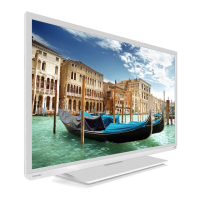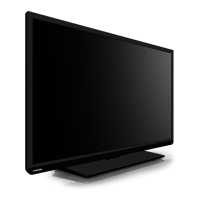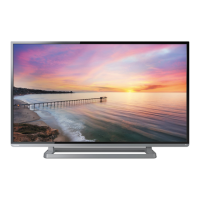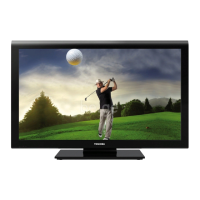Do you have a question about the Toshiba 40L1334DG and is the answer not in the manual?
Ensures adequate ventilation to prevent overheating and potential damage to the television.
Information on avoiding heat damage from direct sunlight or heaters.
Details on proper power supply connection and precautions for electrical safety.
General advice on operating and maintaining the equipment safely and precautions.
Guidance on selecting a suitable and stable location for the television.
Considerations for digital reception, stationary images, and 4:3 picture retention.
Toshiba's liability limitations for damage caused by misuse or external factors.
Guidelines for safe TV installation, including wall mounting and cable management.
Specific caution regarding the aerial connector to prevent potential damage.
Conditions leading to moisture condensation and warnings about its effects.
Instructions for safely mounting the TV using a wall bracket.
Step-by-step guide on how to detach the TV's pedestal stand.
Diagram and numbering of remote control buttons for quick reference.
Instructions for inserting batteries and info on the remote's effective operating range.
Crucial safety step before connecting external devices to the TV.
Guidance on connecting aerial and SCART cables for decoders or media recorders.
Information on using HDMI for digital audio/video, including supported resolutions.
Instructions for connecting devices using the Side AV input with supplied cables.
Explanation of HDMI input functionality and accepted content protection standards.
Steps for connecting an HDMI device using an HDMI cable.
Instructions for connecting a DVI device using an HDMI-to-DVI cable and audio cables.
Guide to connecting a computer via RGB/PC or HDMI for audio and video display.
Instructions for connecting a DVD player using YPbPr component sockets and audio.
How to connect USB devices to play media files such as music, photos, and videos.
Details on the TV's energy efficiency features and how to reduce energy consumption.
Instructions on how to use the Power Save Mode settings for energy efficiency.
Guidance on seeking professional servicing and repairs for the television.
Steps to turn the TV on from standby mode using the power button.
How to navigate menus and select options using the remote control.
Instructions for using the physical buttons located on the back of the TV.
Tips for reducing energy consumption by adjusting settings or turning off the TV.
Pre-installation checks including aerial connection and CI module insertion.
Procedure for turning on the TV and initiating the first-time installation process.
Steps to select language, country, and search type for broadcast reception.
Instructions for setting the Teletext language preference.
Steps for confirming and starting channel scans (Cable or Aerial).
Description of the auto tuning process, progress display, and cancellation.
What happens after auto tuning completes, including channel list management.
Explanation of why retuning is necessary and how to perform it.
Steps to access the Install and Retune menu for tuning options.
Selecting automatic channel scan options for digital and analogue tuning.
Explanation of auto channel scan operations for digital, analogue, and full scans.
Confirmation process for starting an automatic channel search.
Procedure for manual channel search for digital aerial broadcasts.
Steps for performing a manual search for digital cable broadcasts.
Guide to manually tuning analogue stations and allocating programme positions.
Instructions for fine-tuning analogue channels when no analogue channels are stored.
Information on selecting stereo, mono, or bilingual audio for broadcasts.
How to activate or deactivate subtitles for digital broadcasts.
Methods for accessing the main menu using TV buttons or the remote control.
How to adjust the volume and mute the sound using the TV controls.
Methods for selecting programme positions and viewing broadcast information.
On-screen messages displayed upon switching on after standby or auto power down.
How to view the list of stored channels and their types.
Steps to reposition channels within the channel list.
Procedure for removing unwanted channels from the list.
How to change the name of a stored channel.
Steps to lock or unlock channels, requiring a parental control PIN.
How to display information about the current channel and programme.
Accessing and navigating the EPG to view programme schedules and details.
Menu for adjusting preferred language settings for audio, subtitles, and menus.
Explanation of how preferred language settings are applied.
How to change current audio and subtitle languages.
Accessing the parental control menu by entering the PIN.
Setting maturity level locks based on broadcast information.
Disabling TV buttons using the Child Lock feature.
Procedure for setting or changing the parental control PIN.
Options for locking access to menus or specific menu sections.
Overview of the Picture Settings menu for customizing visual display.
How to navigate and change settings within the Picture Settings menu.
Selecting preset picture modes like Natural, Cinema, Game, Sports, and Dynamic.
Adjusting the screen's lightness and darkness values.
Setting the overall brightness level of the screen.
Adjusting the sharpness of displayed objects on the screen.
Adjusting the colour saturation and vibrancy.
Enabling or disabling power saving features.
Controlling the backlight level for optimal viewing.
Using noise reduction to smooth out picture distortions or pixelation.
Accessing additional picture adjustment controls.
Adjusting contrast dynamically for enhanced picture depth.
Modifying colour temperature for warmer or cooler picture tones.
Changing the picture size and aspect ratio.
Enabling Full Mode for specific high-definition resolutions.
Enhancing black levels when using an HDMI source.
Optimizing picture for film viewing by adjusting frame rates.
Adjusting the skin tone for natural colours.
Adjusting the colour tone for desired hue.
Configuring colour temperature using RGB gain adjustments.
Restoring picture settings to their default values.
Guide to selecting various picture formats for optimal display.
Legal note regarding copyright infringement for commercial display use.
Adjusting picture position when using zoom or subtitle modes.
Explanation of the Auto mode for aspect ratio adjustment based on source information.
Availability of Auto mode for specific input sources.
Using the 16:9 setting for widescreen content.
Adjusting the picture to display subtitles clearly in letterbox formats.
Using the 14:9 setting to zoom the picture to fill the screen.
Option to zoom the 14:9 picture to the screen's limits.
Using the 4:3 setting for true aspect ratio broadcasts.
Using Cinema setting to zoom the 16:9 picture to full screen.
Limitation note for the Picture Zoom feature.
Overview of picture settings available when the TV is in PC mode.
Details on Contrast, Brightness, and Colour Temperature adjustments for PC input.
Menu to adjust the horizontal and vertical position of the PC image.
Automatically positioning the PC image for optimal display.
Adjusting the horizontal position of the PC screen image.
Adjusting the vertical position of the PC screen image.
Correcting interference and banding in PC images.
Adjusting phase for a clearer picture with PC input.
Menu for adjusting sound settings according to personal preferences.
How to navigate and change settings within the Sound Settings menu.
Adjusting the TV's volume level.
Customizing sound modes and equalizer settings for speakers.
Setting the sound output level when headphones are connected.
Selecting sound modes like Mono, Stereo, Dual I, or Dual II.
Using AVL to reduce volume differences between channels or inputs.
Enhancing the TV's bass effect.
Enabling or disabling the surround sound effect.
Setting the digital audio output preference to Compressed or PCM.
Overview of how to configure various TV settings.
Navigating the main Settings menu.
How to select and navigate items within the Settings menu.
Controlling conditional access modules for subscription broadcasts.
Accessing language configuration settings.
Accessing parental settings.
Setting timers for programmes.
Configuring date and time preferences.
Enabling or disabling selected source options.
Accessing other TV settings options.
Procedure for inserting and using a Conditional Access Module (CAM).
How to view the Conditional Access menu options.
Menu for setting sleep timers and programme timers.
How to set the TV to turn off automatically after a specified time.
Setting timers to tune to specific channels at scheduled times.
Steps to add a new timer for programme recording or viewing.
How to modify existing timer settings.
Procedure for removing programmed timers.
Setting the TV's date, time, and time zone.
Enabling or disabling specific input source options.
Selecting connected sources manually when automatic switching fails.
Accessing general configuration preferences for the TV.
General operations for navigating menus and sub-menus.
Setting the display duration for menu screens.
Option to include encrypted channels during channel scans.
Enabling a blue screen display for weak or absent signals.
Information on automatic software updates and manual scanning.
Displays the current version of the TV's application software.
Enabling special audio signals for viewers with hearing impairments.
Activating audio narration tracks for visually impaired viewers.
Setting a timeout for automatic TV shutdown when inactive.
Selecting the broadcast type for proper display.
Enabling TV to search for channel updates while in standby.
Enabling or disabling the store mode for product feature demonstration.
Configuring the TV's power-up preference (Always On, Standby, Last State).
Steps to manually launch the USB Media Browser.
How the USB Media Browser automatically starts when a USB device is plugged in.
Overview of playing media files (music, photos, videos) from USB storage.
Important notes on USB device compatibility and troubleshooting.
Instructions for playing MP3 audio files from a USB memory.
Guide to viewing JPEG photo files from a USB memory.
Using the slideshow feature to display photos from USB.
Steps for selecting and playing video files from USB storage.
Note on 'Folder' view style and the 'All' tab in Media Browser.
Selecting or deselecting subtitle files for video playback.
Setting the 'Movie Subtitle' language for correct display.
Accessing Picture, Sound, and Settings menus from Media Browser.
How to exit the Media Player application.
Selecting the correct language region for text services.
How to view and interact with analogue text services using the TXT button.
Navigating sub-pages within analogue text services.
Using the INFO button to reveal concealed text on quiz pages.
Holding a text page on screen using the OK button.
Accessing the initial page of analogue text services using the RETURN button.
Table of typical video display modes supported by the TV.
Note on potential incompatibility with certain resolutions.
Table detailing signal compatibility across different input sources.
List of supported signal types for each input source.
Indication of signal availability for each input source.
Troubleshooting note for signal display issues.
Safety precaution before connecting external equipment.
Details on pin assignments for the Mini D-sub 15 pin connector.
Categorization of supported media types for USB playback.
File extensions for various media formats.
Supported video codecs and formats.
Audio formats and encoding details for media files.
Important notes and limitations for supported file formats.
Supported broadcast systems and video input standards.
List of external connection ports and their types.
Details about the USB port interface and headphone socket.
Optimal temperature and humidity ranges for operating the TV.
List of items included with the television.
Classification of energy efficiency and estimated power consumption.
TV display aspect ratio and speaker output power.
Weight of the TV with/without stand and its physical dimensions.
Trademarks and registered trademarks related to HDMI and DVB technologies.
Explanation of EIA/CEA-861-D compliance for digital video transmission.
Licensing information for MPEG Layer-3 audio and AVC video technologies.
Notification regarding licensing from Dolby Laboratories.
Information for EU-member states regarding product and battery disposal.
Answers to common questions regarding sound issues.
Answers to common questions regarding picture issues.
Answers to general questions about TV operation and features.
Statement of CE-Mark compliance with European directives.
Identification of the responsible party for CE-Marking.
Details on directives the product complies with.
Applicability of RE/TTE Directive for products with Wireless LAN.
List of countries with local helpline contact numbers.
Contact phone numbers for advanced owner's manual enquiries.
Clarification on the scope of the provided helpline numbers.
| Screen Size | 40 inches |
|---|---|
| Display Type | LCD |
| HDMI Ports | 2 |
| USB Ports | 1 |
| Refresh Rate | 50 Hz |
| Backlight Technology | LED |
| Sound Output | 2 x 8W |
| Weight | 8.5 kg |
| Resolution | 1920 x 1080 pixels |
| Built-in Tuner | DVB-T/C |












